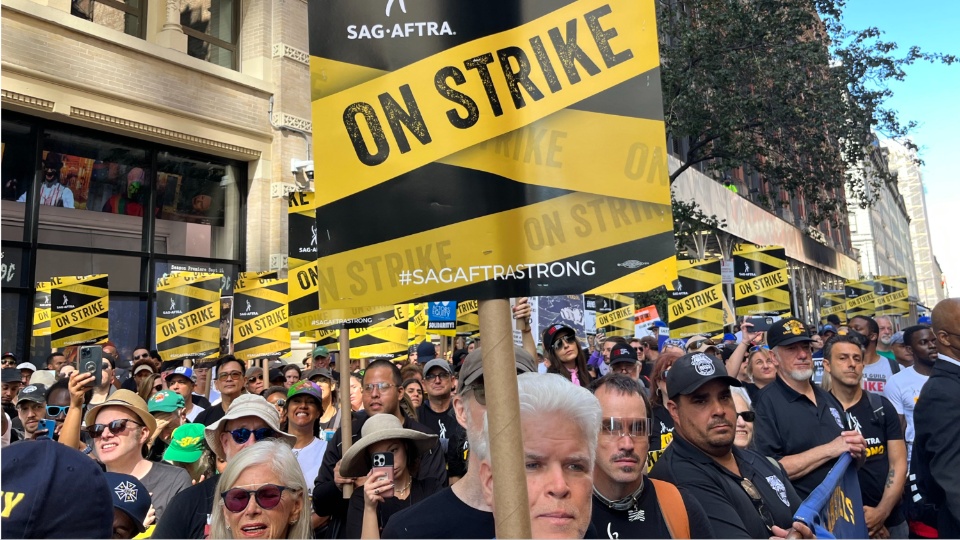
HOLLYWOOD, Calif.—Major Hollywood studio bosses torpedoed their Oct. 12 bargaining session with SAG-AFTRA by low-balling the performers the union represents. And then they walked out, the union added.
Which means the 168,000 members of SAG-AFTRA will still be on the picket lines against their bosses, the Alliance of Motion Picture and Theater Producers, from New York and Boston to Chicago and Los Angeles, who also include stage, TV, and streaming video firms. The strike began in July.
“It is with profound disappointment that we report the industry CEOs have walked away from the bargaining table after refusing to counter our latest offer,” the union reported after the first talks in more than two weeks.
“We have negotiated with them in good faith, despite the fact that last week they presented an offer that was, shockingly, worth less than they proposed before the strike began.
“These companies refuse to protect performers from being replaced by AI (artificial intelligence), they refuse to increase your wages to keep up with inflation, and they refuse to share a tiny portion of the immense revenue YOUR work generates for them.”
AI is computer-generated artificial intelligence, whose wage-saving potential the movie studios, livestream producers, and TV executives salivate have been salivating over for years. It lets them film the image, clothes, mannerisms, and voice of a performer in a day-long session, pay her for that—and then endlessly combine and reproduce her for screen, stream, or TV without having ever to pay her again.
“We have made big, meaningful counters on our end, including completely transforming our revenue share proposal, which would cost the companies less than 57¢ per subscriber each year. They have rejected our proposals and refused to counter,” the union said of the execs, who ranged from Disney CEO Bob Iger—who makes $27 million a year—down to Broadway producers.
“Instead they use bully tactics,” SAG-AFTRA said of bosses. “Just tonight, they intentionally misrepresented to the press the cost of the above proposal” by the union, “overstating it by 60%. They have done the same with AI, claiming to protect performer consent, but continuing to demand ‘consent’ on the first day of employment for use of a performer’s digital replica for an entire cinematic universe (or any franchise project).”
Those issues, plus wage offers that would lose even more ground to inflation, skimpy residual income which the studios refuse to replace, and ineligibility for health care for any performer earning under $26,000 yearly—in an industry where, other than the biggest stars, people scrounge from week to week—are the biggest issues on the table.
The companies tried the same tactics with the Writers Guild of America, whose 11,500 members had to walk in May and stayed out 148 days, SAG-AFTRA said. It failed and the WGA won all the points SAG-AFTRA is seeking and just ratified its new three-year contract with AMPTP by a 99%-1% margin. SAG-AFTRA and AMPTP are also jousting over a proposed three-year pact.
They also won’t work with SAG-AFTRA members, despite one unnamed honcho’s early statement to the Hollywood trade press that the bosses’ strategy was to literally starve the performers out, to the point where they couldn’t eat and also faced eviction in high-cost L.A.
“We have sacrificed too much to capitulate to their stonewalling and greed. We stand united and ready to negotiate today, tomorrow, and every day,” the SAG-AFTRA bargainers concluded.
One studio executive who attended part of the last session, NBCUniversal Chief Content Officer Donna Langley, told Bloomberg the executives were also willing to bargain “for as long as it takes” to agree. The three top CEOs at the bargaining who then walked out, Disney’s Iger, Netflix co-CEO Ted Sarandos, and Warner Bros./Discovery CEO David Zaslav, did not comment for the record.
But the talks may be unexpectedly long, Langley said. That happened in the Writer’s Guild talks. She called “the experience…difficult because we had to deal with issues like AI and minimum staffing and things that had up until this point been unprecedented,” she said. “I can’t speak to why it took the time that it took. It just took the time that it took.”
We hope you appreciated this article. At People’s World, we believe news and information should be free and accessible to all, but we need your help. Our journalism is free of corporate influence and paywalls because we are totally reader-supported. Only you, our readers and supporters, make this possible. If you enjoy reading People’s World and the stories we bring you, please support our work by donating or becoming a monthly sustainer today. Thank you!











Comments